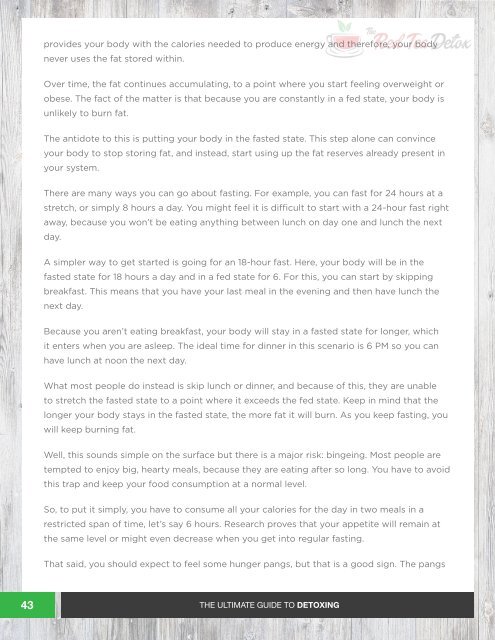Ultimate Guide To Detoxing
- No tags were found...
You also want an ePaper? Increase the reach of your titles
YUMPU automatically turns print PDFs into web optimized ePapers that Google loves.
provides your body with the calories needed to produce energy and therefore, your body<br />
never uses the fat stored within.<br />
Over time, the fat continues accumulating, to a point where you start feeling overweight or<br />
obese. The fact of the matter is that because you are constantly in a fed state, your body is<br />
unlikely to burn fat.<br />
The antidote to this is putting your body in the fasted state. This step alone can convince<br />
your body to stop storing fat, and instead, start using up the fat reserves already present in<br />
your system.<br />
There are many ways you can go about fasting. For example, you can fast for 24 hours at a<br />
stretch, or simply 8 hours a day. You might feel it is difficult to start with a 24-hour fast right<br />
away, because you won’t be eating anything between lunch on day one and lunch the next<br />
day.<br />
A simpler way to get started is going for an 18-hour fast. Here, your body will be in the<br />
fasted state for 18 hours a day and in a fed state for 6. For this, you can start by skipping<br />
breakfast. This means that you have your last meal in the evening and then have lunch the<br />
next day.<br />
Because you aren’t eating breakfast, your body will stay in a fasted state for longer, which<br />
it enters when you are asleep. The ideal time for dinner in this scenario is 6 PM so you can<br />
have lunch at noon the next day.<br />
What most people do instead is skip lunch or dinner, and because of this, they are unable<br />
to stretch the fasted state to a point where it exceeds the fed state. Keep in mind that the<br />
longer your body stays in the fasted state, the more fat it will burn. As you keep fasting, you<br />
will keep burning fat.<br />
Well, this sounds simple on the surface but there is a major risk: bingeing. Most people are<br />
tempted to enjoy big, hearty meals, because they are eating after so long. You have to avoid<br />
this trap and keep your food consumption at a normal level.<br />
So, to put it simply, you have to consume all your calories for the day in two meals in a<br />
restricted span of time, let’s say 6 hours. Research proves that your appetite will remain at<br />
the same level or might even decrease when you get into regular fasting.<br />
That said, you should expect to feel some hunger pangs, but that is a good sign. The pangs<br />
43 THE ULTIMATE GUIDE TO DETOXING



